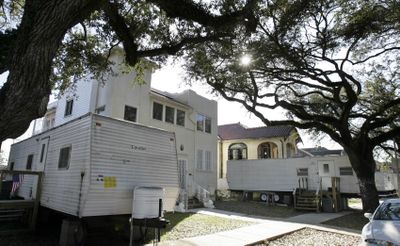FEMA seeks lawsuit immunity
Formaldehyde-laden trailers prompt charges of negligence

NEW ORLEANS – The Federal Emergency Management Agency asked a federal judge Wednesday for immunity from lawsuits over potentially dangerous fumes in government-issued trailers that have housed tens of thousands of Gulf Coast hurricane victims.
Lawyers for victims of hurricanes Katrina and Rita accuse FEMA of negligence for sheltering them in trailers with elevated levels of formaldehyde, a preservative used in construction materials that can cause health problems.
But a government attorney told U.S. District Judge Kurt Engelhardt that FEMA’s decisions in responding to a disaster, including its use of travel trailers after Katrina, are legally protected from “judicial second-guessing.”
“It is what the legislative branch is supposed to second guess, and they are doing that,” Department of Justice attorney Henry Miller said, referring to congressional hearings on formaldehyde concerns.
Plaintiffs attorney Gerald Meunier said FEMA can be held liable for providing hurricane victims with trailers that didn’t meet federal safety standards and weren’t designed to be long-term housing.
Engelhardt took FEMA’s request for immunity under advisement and didn’t indicate how soon he will rule.
FEMA spent more than $2.5 billion to purchase more than 140,000 new trailers from recreational vehicle dealers and trailer manufacturers after the storms.
The lawsuits accuse trailer makers of providing FEMA with shoddily built units in a rush to meet the agency’s unprecedented demand for emergency housing. Plaintiffs lawyers also claim FEMA ignored concerns about formaldehyde levels in trailers for months after Katrina.
“At what point do you say, ‘We know there’s a crisis here, but there is a minimal standard where people have got to be protected against danger,’ ” Meunier said.
Miller said FEMA fielded its first formaldehyde complaint from a trailer occupant in March 2006 and only had seven or eight complaints by June 2006.
“What was the alternative (to using trailers)?” Miller asked. “To move them to Baton Rouge, to move them to Arkansas, to move them to Texas?”